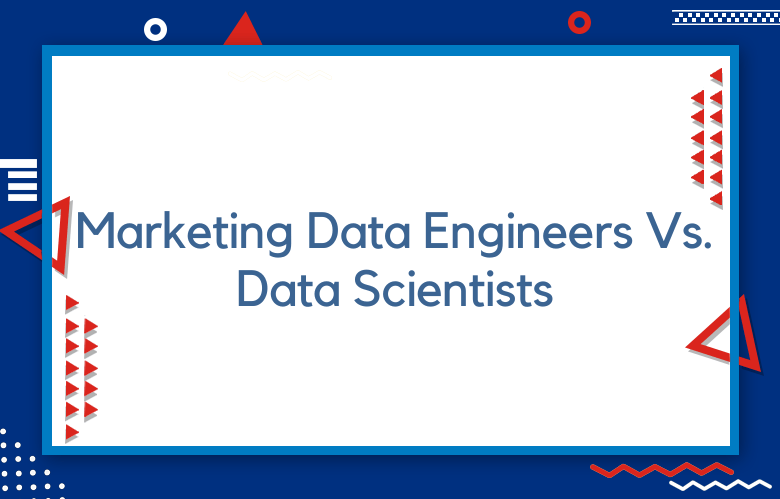Marketing Data Engineers Vs Marketing Data Scientists: A Detailed Comparative Overview

Marketing has changed significantly over the years with the rise of digital technologies. And with the increased importance of data-driven marketing, new roles have emerged in the marketing field. In particular, data-driven marketing requires the skills of both data engineers and data scientists.
Marketing data engineers and data scientists play different roles, but they work together to help marketing departments make informed decisions based on data insights. We will compare the functions of marketing data engineers and marketing data scientists.
Marketing data engineers create, design, and maintain data pipelines. Their role is critical in ensuring data is correctly processed, transformed, and loaded from different sources.
They ensure that data is clean, accurate, and reliable and optimize databases for querying and analysis. Data engineers create and maintain data infrastructure to manage large volumes of data, ensuring that data is safe, scalable, and fault-tolerant.
The Difference between Data Engineers and Data Scientists
The field of data science is a complex and dynamic discipline that requires diverse specialized skills. Data engineers and data scientists are two of the most crucial and sought-after roles in any data-driven organization.
Although these roles share some similarities, they are fundamentally different in their responsibilities, skill sets, and day-to-day workflows.
Data engineers primarily focus on data pipeline engineering, architecture, and infrastructure development. They are responsible for designing, developing, and maintaining the systems that collect, clean, store, and manage data.
Data engineers leverage Hadoop, Spark, SQL, and NoSQL technologies to build scalable and reliable data pipelines, databases, and data warehousing solutions.
They collaborate closely with data scientists, product managers, and business analysts to ensure data workflows align with business goals and requirements.
Understanding the Roles of Data Engineers and Data Scientists
Organizations rely heavily on data to make informed decisions in today’s data-driven world. Data engineers and data scientists are two key players in this process. While their roles may appear similar at first glance, they have distinct responsibilities essential for successful data management.
Data engineers are responsible for designing, constructing, and maintaining data architecture. They build the infrastructure that allows data scientists to analyze and derive insight from large volumes of data.
Data engineers are skilled in data warehousing, modeling, and big data platforms like Hadoop and Spark. They also ensure data security and integrity by implementing various data management protocols and tools.
Exploring the Distinctions: Data Engineers vs. Data Scientists
Exploring the distinctions between data engineers and data scientists reveals that while the two professions appear closely related, several significant differences set them apart.
Data engineers are primarily responsible for designing, constructing, and maintaining the large databases and data processing platforms that support data scientists’ work.
In contrast, data scientists are concerned with analyzing the complex data sets generated by these platforms to uncover patterns, correlations, and insights.
Data engineers must, therefore, have a deep understanding of the underlying technologies and systems that allow large-scale data management, such as Hadoop, Spark, and NoSQL databases.
They must also be skilled in programming languages like Java, Python, and SQL and have experience with cloud-based platforms such as Amazon Web Services (AWS) or Microsoft Azure.
In addition, they must be proficient in integrating data across various sources, solving technical problems, and ensuring data security.
Comparing the Skillsets: Data Engineers Vs. Data Scientists
Given the increasing importance and reliance on data-driven insights for business decisions, the roles of data engineers and data scientists are becoming crucial in modern-day companies.
Though there are overlaps in their work responsibilities, there are also significant differences that set them apart.
Data engineers are primarily responsible for constructing, maintaining, and optimizing the infrastructure and architecture required to support the analysis and interpretation of data.
This includes developing and maintaining the databases, designing data pipelines, and ensuring efficient data processing and storage.
In addition, data engineers also have expertise in programming languages, data modeling, and data warehousing concepts, which enables them to design and execute optimal data solutions for clients.
Job Market Analysis: Data Engineers Vs. Data Scientists
In today’s digital age, the job market constantly evolves, particularly in data analytics. Among the most in-demand positions are data engineers and data scientists.
Both positions require a deep understanding of data manipulation and interpretation, statistical analysis, programming skills, and strong problem-solving abilities. However, the two job roles differ in their primary responsibilities, skill sets, and salary ranges.
Data engineers are responsible for designing, building, and maintaining the infrastructure that manages big data. They work on building data pipelines and data architecture to ensure efficient data storage, retrieval, and processing.
Their role involves programming and developing algorithms to automate data processing and maintain data quality.
The primary skills required for data engineering include knowledge of programming languages like Python, Java, or Scala, proficiency in database systems like MySQL or PostgreSQL, and big data processing platforms like Hadoop or Spark.
The Hierarchy of Data Processes
The hierarchy of data processes refers to the different stages of handling and analyzing data to extract meaning and insights.
This process begins with data collection, gathering and storing raw data in a database or other system. This data can come from various sources, such as sensors, social media, financial transactions, or user inputs.
Once the data is collected, the next step is data cleaning and preparation. This involves removing irrelevant or redundant data, fixing errors or inconsistencies, and formatting the data to be easily analyzed. This step is critical to ensuring the accuracy and reliability of the final analysis.
After data cleaning and preparation, the data is ready for analysis. This can include various techniques, such as statistical analysis, machine learning, or data visualization. The study aims to uncover patterns and insights in the data that can help inform decision-making.
Tasks and Competencies of Data Engineers
Data engineering is a critical component of today’s data-driven businesses, where the accuracy, reliability, and efficiency of data processing are crucial for informed decision-making and competitive edge.
The primary role of a data engineer is to design, develop, test, deploy, and maintain data pipelines, databases, and data warehouses that can handle large, complex, and diverse data sets generated from various sources, such as IoT devices, social media, online transactions, and internal systems.
To perform these tasks effectively, data engineers need to possess a range of competencies and skills, which include:
Data Modeling
Data engineers must thoroughly understand data modeling principles and techniques that help organize and structure data for efficient storage, retrieval, and analysis.
They should be proficient in designing relational, non-relational, and hybrid data models that align with the business requirements and data quality standards.
Data Integration
Data engineers must have expertise in integrating data from various sources, such as APIs, file systems, databases, and streaming platforms, into a unified and coherent data ecosystem.
Before loading it into the target system, they must ensure the data is cleansed, transformed, and enriched according to the data governance policies.
Data Processing
Data engineers should be able to develop and optimize data processing workflows that can handle large volumes of data with low latency and high throughput.
They must have experience in using data processing frameworks and technologies, such as Apache Spark, Hadoop, Flink, and Kafka, to implement batch and real-time data processing solutions.
Cloud Computing
Data engineers need expertise in cloud computing platforms like AWS, Azure, and GCP to leverage cloud-based data infrastructure’s scalability, elasticity, and cost efficiency.
They must be familiar with cloud-native tools and services, such as S3, EC2, Lambda, and Kubernetes, that can automate and orchestrate data workflows.
Data quality
Data engineers must ensure that the data quality is maintained throughout the lifecycle by applying data profiling, cleaning, validation, and enrichment techniques. They must also monitor data quality metrics and alerts to detect and resolve anomalies and errors before they impact the business.
In summary, data engineers play a critical role in enabling organizations to harness the power of data by designing and implementing robust, scalable, and reliable data infrastructure and processing pipelines.
The competencies and skills of data engineers are essential for delivering accurate, timely, and relevant data insights that drive business value and innovation.
Responsibilities and Skills of Data Scientists
Data Gathering and Processing
Data scientists are responsible for gathering, processing, and preparing data for analysis. This includes extracting data from various sources such as databases, web APIs, and other sources.
They must also be able to process the data in a way that makes it suitable for analysis. This may involve cleaning up the data, formatting it correctly, or transforming it into a format that analytical tools or algorithms can use.
Analytical Skills
Data scientists must possess strong analytical skills to analyze their gathered data effectively.
This includes identifying patterns and trends in the data and drawing conclusions based on the analysis. They must also communicate their findings clearly so that others can understand them.
Statistical Knowledge
Data scientists must also have a strong understanding of statistics to analyze data sets properly.
They must be familiar with various statistical techniques such as regression analysis, hypothesis testing, and machine learning algorithms. They should understand how to interpret statistical results to draw meaningful insights.
Technical Knowledge
Data scientists must also understand computer programming languages such as Python and R to build tools for analyzing large datasets and creating visualizations of the results. They should know about database systems such as SQL to query and manipulate datasets efficiently.
Problem-Solving Skills
Data scientists must possess strong problem-solving skills to identify problems within datasets and develop solutions for them. This requires thinking logically and systematically about complex issues while considering multiple factors simultaneously.
They should be able to think creatively when faced with challenging problems to come up with innovative solutions that may not have been considered before
Communication Skills
Data scientists must also possess excellent communication skills to collaborate effectively with other team members or with other departments within an organization.
This includes explaining technical concepts clearly so that non-technical people can understand them quickly and nearly so that others can act on them promptly and efficiently.
Business Acumen
Data scientists should also understand operations and know howtheir work fits into an organization’s or project team’s overall business strategy.
They should be familiar with key performance indicators (KPIs) such as customer acquisition costs (CAC) or return on investment (ROI) so that they can better assess the impact of their work on business operations.
Leadership Skills
Data scientists should have strong leadership skills to effectively manage projects, teams, and resources.
This includes motivating others, delegating tasks effectively, making decisions quickly, resolving conflicts, and providing constructive feedback. They should be comfortable working independently while remaining accountable for their work.
Job Openings and Salaries in the Data Science Field
The data science field is a highly sought-after industry, as it is one of the most rapidly growing fields in terms of job opportunities and salaries.
With the advent of big data and the ever-advancing field of artificial intelligence, the demand for data scientists has increased exponentially in recent years. According to recent statistics, there were over 3 million job openings in the data science field in 2020 alone.
Furthermore, data scientists are among the highest-paid professionals in the industry. The median annual salary for a data scientist in the United States is approximately $120,000, with some earning well over $200,000 annually.
This is partly due to the high demand for skilled data scientists who possess a wide range of skills, including proficiency in programming languages such as Python, R, and SQL, as well as machine learning and statistical analysis techniques.
The State of the Data Job Market: Data Engineers Vs. Data Scientists
As we move towards a data-driven world, the demand for professionals who can efficiently process and interpret large amounts of data is increasing at an unprecedented pace. Engineers and scientists are the two most sought-after roles in the data job market.
Data engineers are responsible for designing and maintaining data pipelines and infrastructure. They build and optimize data systems, ensuring data processing is efficient, reliable, and secure.
They work on data storage, transformation, and integration, among other things. These engineers ensure that data is properly stored and can be accessed by other data professionals.
On the other hand, data scientists analyze data to extract valuable insights and information. They use advanced statistical and machine learning techniques to predict future trends, patterns, and outcomes.
They are responsible for designing experiments, collecting and processing data, and communicating data insights to stakeholders.
Conclusion
Marketing data engineers and data scientists play different yet complementary roles, which is crucial for managing data-driven marketing data.
Data engineers ensure the underlying data infrastructure is reliable, fast, and secure, while data scientists extract insights from the data using advanced analytic techniques. As marketing continues to be data-driven, the importance of these roles will only continue to grow.
These roles will likely remain the same, so companies should view them as separate disciplines and invest in both these roles accordingly. Investing in these roles will ensure that companies can maintain and improve their data-driven marketing strategies and, in the process, achieve success.
In conclusion, Marketing Data Engineers and Marketing Data Scientists both play critical roles in the successful functioning of a marketing analytics team.
While Marketing Data Engineers focus on the infrastructure and data pipeline, Marketing Data Scientists are concerned with the analytical aspect of marketing data.
Both roles require different skill sets, but they work seamlessly to ensure marketing professionals receive clean, reliable, and actionable data for making informed business decisions.
Knowing the differences between these two roles can help you make informed choices regarding the appropriate skill set for your marketing analytics team.



